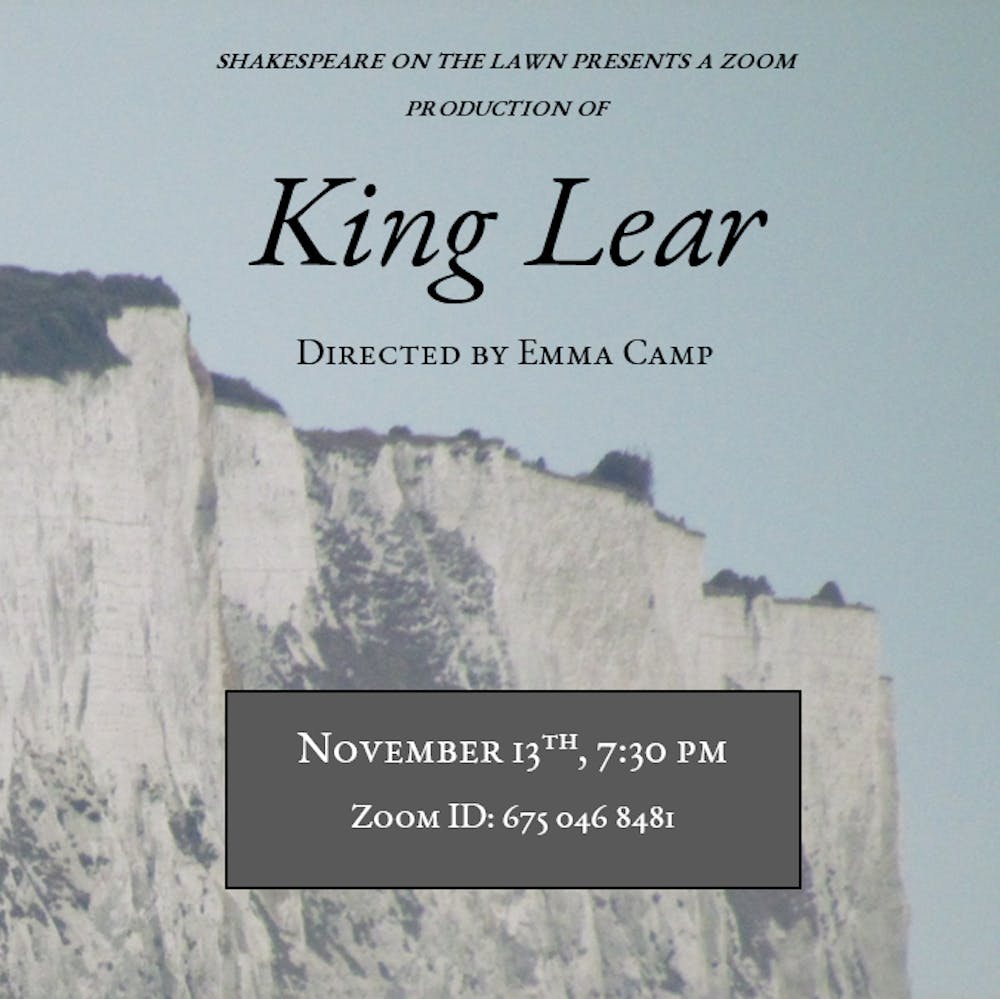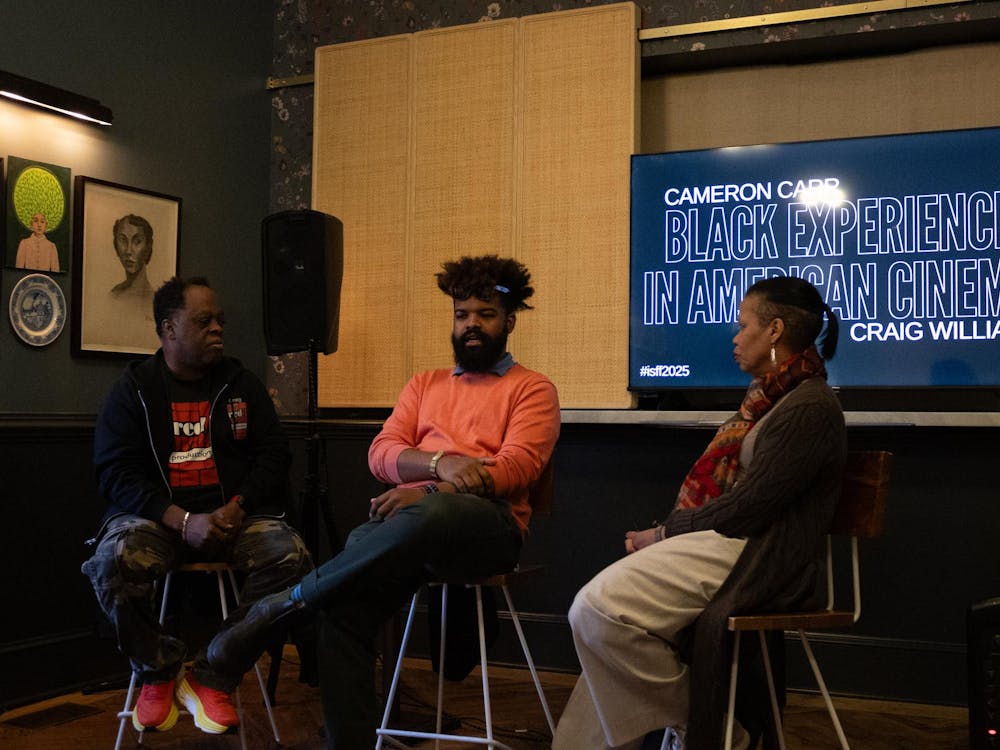Lea en español
The plays of Shakespeare are no strangers to creative adaptations — rather than different time periods or contexts, though, this semester’s Shakespeare on the Lawn’s production takes the classic tale of “King Lear” online. Third-year College student Emma Camp is directing this production of “King Lear,” which will be showcased through Zoom on Friday, Nov. 13 at 7:30 p.m. To adapt to present conditions, the remote rendition of the play will feature modernly dressed actors in front of sheets of similar color palettes put up in their rooms as “sets.” Despite these adjustments though, the play will remain faithful to the text’s themes of family, power and omnipresent death.
The Cavalier Daily sat down with Camp to discuss “King Lear’s” central themes and its imperfect relevance to the COVID-19 pandemic, as well as the challenges and opportunities a Zoom setting creates for theater. The play tells the story of a king who decides to divide the control of his land amongst his three daughters, who each are concerned with their own agenda. Tragedy and intrigue ensue, as the struggle for power amongst the family and their close confidants threaten to tear them apart.
Portions of this interview have been edited and condensed for clarity.
The Cavalier Daily: There's a bit of historical controversy around this matter, but the general story of how “King Lear” came to be — that you hear people talking about lately to talk about creativity in the pandemic — is that Shakespeare wrote “King Lear” during a plague outbreak. Did that story affect your decision to propose “King Lear” to Shakespeare on the Lawn at all?
Emma Camp: Yeah, it did, definitely. I was very much aware of the historical controversy around it. So I introduced it as, you know, that this may or may not be kind of a myth around this play, but it adds a certain thematic significance to our current historical era.
Also, I mean, I have liked “King Lear” for a long time. I'm attracted to it for the same reason I'm attracted to other Shakespeare plays that I particularly like. It's a story about family and our relationships to other people. And it also has this kind of — I don’t wanna say dark and spooky, because that sounds a bit too cliché — but it has these kinds of mystical elements to it. There's a lot of indications to astrology and gods, and it seems to exist in this world that is kind of outside of history. It doesn't take place in a defined historical era. It might as well be set in a mythical past. So I think that both leads to a lot of intrigue to the events, but I think it also makes it quite flexible for a modern director.
CD: “King Lear” is often regarded as a very bleak play with very dark themes. In what ways do you see those themes as relevant to today?
EC: I think it's hard to talk about “King Lear” as being relevant to today, based on the fact that it was written 400 years ago. I think it is a product of its time and a product of the context of early 17th century England. But I do think maybe one way in which that context could be relevant to today is that I think we are living — especially for wealthy people in the global West, and particularly America — we're living in a time of a lot of death. Death and physical ailments, and physical suffering, are really present, and they can kind of get anyone in a way that we're not used to them being.
The early 17th century was a time in which death could come for anyone at any time. Sickness could come for anyone at any time. There's nothing you can do about it. Queen Elizabeth almost died of smallpox. So I think there's a little bit of that here. We're living in a time of great uncertainty, right? People don't know what their future is going to look like. They don't know whether or not they're going to get this terrible disease. They don't know if someone they love is going to pass away from this terrible disease. I think that that level of uncertainty, while it does not — for a generally wealthy, modern American — even come close to the 16th century, I think it's closer now than how we have been recently within the past decade or century. That environment of uncertainty was always there in the early 17th century. And we're getting a bit of that now.
CD: Are there any other challenges, or particularly rewarding aspects of directing remotely, that you'd like to speak on?
EC: I think one of the rewarding things about it is that people who might not otherwise be in a [Shakespeare on the Lawn] show, because they're not like at U.Va. right now, can do that. It's definitely interesting that you have a lot less rehearsal time, because you don't have to worry about blocking. Blocking is basically the motions that you're doing. We do actually have two actors who are twins. They're living in the same house. One actor is playing an actor that gouges out the other actor’s eyes, and so we could actually have real blocking. It does have a certain kind of feeling, like you're getting a group together and having community, which is rare at the moment.
The show is also partnering with the Accessible Theater Project for sensory-friendly theater for people who may have various disabilities, including autism. It’s really important to me because I am an autistic person. One of the nice things about King Lear is that it’s basically PG-13. ATP — I'm also on the Executive Board of ATP — in the past has mostly done theatre for children. But something that I know firsthand is that autistic children turn into autistic teenagers and autistic adults. It's very much a myth in our culture, and in our portrayal of autistic people, that they're only children. So I think it's important to have theatre that is accessible for those teenagers and adults.
And so the nice thing about doing theater online is that we didn't have to make a lot of changes to make that sensory friendly, because it's very customizable. If the sounds are too loud, you can turn down volume. If the screen is too bright, you can turn down the screen brightness, etc. Normally, if this was an onstage production, we would do it without house lights down, probably a matinee. Sound cues would be [at a] lower volume, etc.
Shakespearean language is also difficult for most people the first time, so providing a detailed synopsis and character summaries with pictures of the actors help people follow along. We’re also providing the script. So if people want to read along, especially if it's their first time encountering Shakespeare, it can help them keep on track of what's happening. I think that's very rewarding for me, personally, to be able to do that.
“King Lear” will be performed at 7:30 p.m. on Nov. 13. Details about how to access the show can be found on Shakespeare on the Lawn’s social media accounts.







